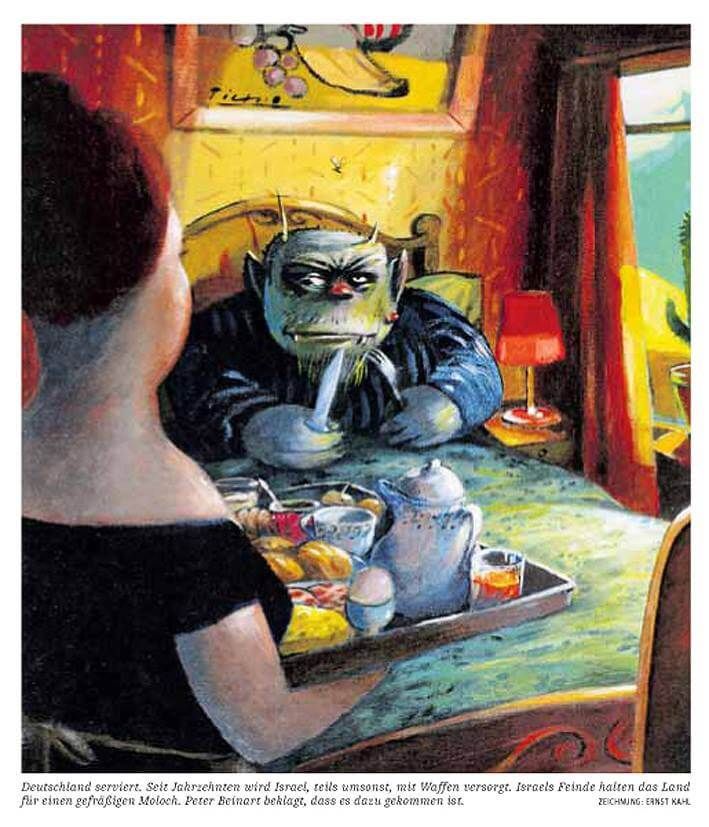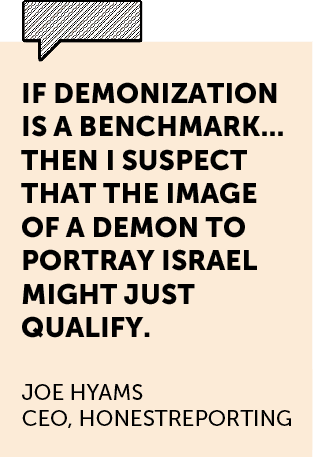Apparently in Europe today, anti-Semitic imagery is becoming increasingly mainstream. This year we have seen a Norwegian paper’s crude attack on circumcision as well as the UK’s Sunday Times cartoon promoting hate on Holocaust Memorial Day.
Now, Germany’s most widely-read broadsheet daily “Süddeutsche Zeitung” has accompanied a review of liberal Jewish American commentator Peter Beinart’s book with this cartoon:
The caption beneath translates as:
Germany is serving. For decades now, Israel has been given weapons, and partly free of charge. Israel’s enemies think it is a ravenous Moloch. Peter Beinart deplores this situation.
Moloch was a Canaanite and Phoenician deity associated with child sacrifice.
Given the anti-Semitic blood libel against Jews of killing gentile children and the related libel that portrays Israel as a child-killer, the message behind the imagery is impossible to ignore.
That a German newspaper has published this, in light of that country’s particular history, makes this all the more outrageous.
Is this further evidence of the demonization of Israel and the Jews in Europe? Read our exclusive interview with Professor Manfred Gerstenfeld, who claims that recent studies suggest that over 150 million Europeans hold a demonic view of Israel.
Following much criticism, the newspaper acknowledged that it would have been better to have used another image but maintained that the cartoon was not anti-Semitic and there had been a “misunderstanding.”
Perhaps the misunderstanding is in the newspaper’s contention that Israel and Judaism are two unrelated concepts (translated from the German):
Ernst Kahl’s horned, hungry monster has nothing to do with anti-Semitic stereotypes. One must look at the picture along with the caption. … So, only the enemies of Israel see Israel in a way that is similar to the monster pictured. In addition, the State of Israel is not to be equated with Judaism.
Trying to separate Israel and Zionism from the Jewish people is a tactic employed by those who claim that their anti-Zionism and hatred of Israel cannot possibly be motivated by anti-Semitism be it intentional or not.
In rival German newspaper Die Welt, Henryk Broder writes that there is something even worse at work here. He points out that the cartoon is not a new one. The artist, Ernst Kahl, had neither Israel nor the Jews in mind when he drew it – the cartoon was not commissioned to illustrate anything to do with Israel, the Jews or the Peter Beinart book.
Indeed, as a blog in the Jerusalem Post points out:
As the Jüdische Allgemeine reports, the drawing of the “voracious Moloch” was originally done for a culinary magazine and artist Ernst Kahl was horrified to learn that theSüddeutsche Zeitung had used his drawing in a very different context than he had envisaged when he drew the image.
The Süddeutsche Zeitung chose, by way of the accompanying caption, to associate with Israel and the Jews with what was originally a harmless drawing. It was this deliberate contextualizing on the part of the newspaper that turned the image into an anti-Semitic one.
While the cartoon was not anti-Semitic in itself, the Süddeutsche Zeitung’s made it so by associating its caption with Israel.
For a German newspaper, of all European publications, to portray Israel as a child sacrificing monster, demonstrates that the lessons of the past have clearly not been learned. Instead of claiming a misunderstanding, the Süddeutsche Zeitung should immediately apologize and acknowledge that the use of this image in the context of this article is completely unacceptable.
If demonization is a benchmark, as stated in the EU’s own working definition of anti-Semitism, then I suspect that the image of a demon to portray Israel might just qualify.
How can Süddeutsche Zeitung claim that there has been a misunderstanding? There is no disguising the hateful attitude towards Israel.
This is unacceptable in the pages of a German newspaper. Please send your complaints to [email protected]




